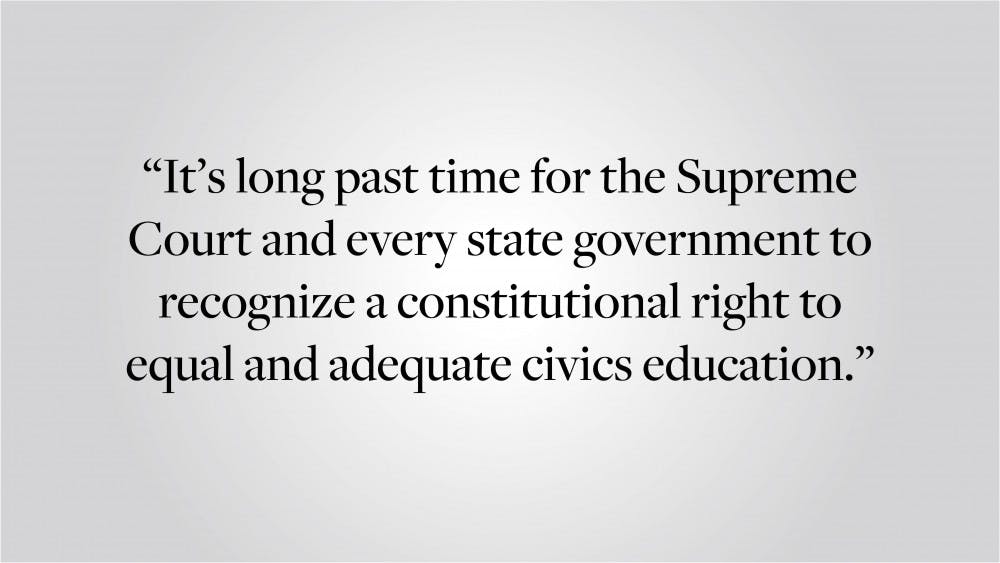What’s a right without a remedy? Rhode Island’s public school students learned the answer all too recently: It’s no right at all.
In November 2018, a group of student petitioners filed suit in the District Court of Rhode Island alleging that in failing to provide public school students with an adequate civics education, the state had violated their rights under the Fourteenth, Sixth and Seventh Amendments of the U.S. Constitution.
Last October, their case was dismissed. But in a rare showing of jurisprudential anguish, Judge William E. Smith’s opinion highlighted the colossal democratic dilemma at the heart of the students’ complaints. “This case does not represent a wild-eyed effort to expand the reach of substantive due process,” he wrote, “but rather a cry for help from a generation of young people who are destined to inherit a country which we — the generation currently in charge — are not stewarding well.”
So why couldn’t Smith answer their cry? Sit down and take out your notebook: It’s time for some Civics 101.
American federalism, the system of shared sovereignty between the national government and the states, grants state and local governments near-exclusive control over public education policy. States provide the bulk of public school funding, direct faculty selection processes and decide what to include — and not include — in school curricula. Since the 1960s, the federal government has become more involved in funding and overseeing public education; still, it has imposed few substantive regulations on public school course requirements.
Moreover, federal courts have never recognized a right to effective public school education. In San Antonio Public School District v. Rodriguez (1973), the Supreme Court found that “education … is not among the rights afforded explicit protection” under the Constitution. Though admitting that “some identifiable quantum of education” may be “a constitutionally protected prerequisite to the meaningful exercise of (individual rights),” the Court did not expand upon what this narrow exception might look like in practice. In the wake of San Antonio, Smith regretfully informed the plaintiffs, his hands were tied.
The Supreme Court was wrong. Democracy is fragile, its success reliant on the active engagement of a well-informed citizenry. While the Framers may not have explicitly enshrined a right to education in the Constitution, the right is nevertheless essential to safeguarding that document’s core principles of political liberty and equality. In 1787, Thomas Jefferson wrote that to “enable (the people) to see that it is their interest to preserve peace and order,” the nation must “educate and inform the whole mass of people.” James Madison echoed a similar thought in 1825, writing that “the advancement and diffusion of knowledge is the only guardian of true liberty.”
Today, the prescience of their words can hardly be overstated. Unawareness of fundamental civics could explain the modern American public's doubt in democracy and its merits. Recent surveys of the American public have shown that nearly a quarter of citizens in their teens and early twenties think that democracy is a “bad” or “very bad” way to run a country, and nearly 30 percent of all Americans could “imagine supporting” a military takeover of the federal government. Moreover, a lack of civics education explains why many Americans do not know key facts of political life. A third of Americans cannot name their state’s governor. One in five cannot name a single branch of government, and only two in five can correctly name all three branches.
Federalism can provide benefits to citizens and lawmakers across a range of policy arenas. Education is not one of them. When the abstract virtues of federalism take precedence over the very real fates of our nation’s students, inequality and civic illiteracy are no longer mere bugs in the system. They are features.
All of this spells trouble for American democracy — trouble of the sort that the Framers would have held in catastrophic regard. As the student petitioners in A.C. v. Raimondo recognized, their right to participate fully in the democratic process is contingent upon an education that “prepares them adequately to vote, to exercise free speech, petition the government, actively engage in civic life and exercise all of their constitutional rights.” Educational disparities not only deprive students of their constitutional right to the equal protection of the laws, but also contribute to the precipitous decline in the public’s understanding of the republican tradition it inherits. While Rhode Island’s failure is far from unique, this state is no less responsible for the harm that it has caused both to the potential of this generation and the legacy of generations past.
The state’s unwillingness to offer a sufficient public school curriculum in civics education — and the Court’s inability to force its hand — yields an outcome as ironic as it is cruel. By neglecting to inform its students about the democratic tradition that they will eventually inherit, the state has, in effect, relocated the civics classroom to the courthouse. Indeed, Smith’s opinion, written like a civics lesson, is perhaps the first formal encounter with civics education that Rhode Island’s student petitioners have ever had. It may also be the last.
This is, quite literally, a question of civic proportions. Rhode Island students deserve better. All students do. It’s long past time for the Supreme Court and every state government to recognize a constitutional right to equal and adequate civics education.
Olivia Siemens ’21 can be reached at olivia_siemens@brown.edu. Please send responses to this opinion to letters@browndailyherald.com and op-eds to opinions@browndailyherald.com.





